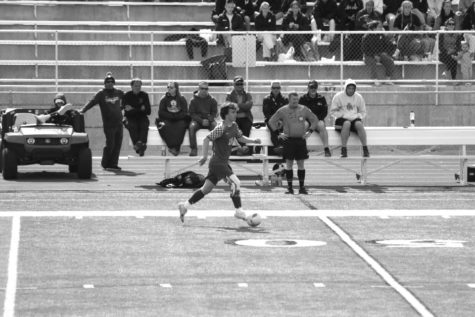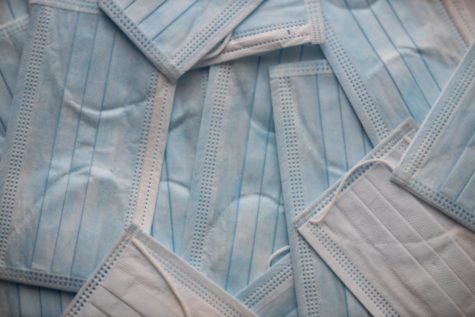Sheridan senior perservers through medical issues
Olivia Eldridge poses with her dog, Junabee, she explains, “Junabee is my favorite thing in the entire world, she is the best dog out there!”
Missing 88 days her freshman year, 149 her sophomore year, 87 her junior year, Olivia Mae Eldridge still persevered through her medical set backs in school.
Eldridge’s story began her freshman year when she transferred over to Sheridan High School from Holy Name Catholic School. During one of the beginning basketball games of the season, Eldridge began succumb to unidentified illnesses.
“I threw up 26 times,” she explained, “I couldn’t stand, and I was passing out.” That night she went to the emergency room with unbearable pain in her right abdomen and she had many tests administered to her, but the doctors discovered nothing.
Eldridge went back to the doctor many times after her first incident trying to determine what caused the pain and nausea she was facing. It was two months before the doctors ever found anything wrong.
“The entire time I hardly ate, I lost 40 pounds due to nausea, and the tests kept coming up negative.” After blood tests, celiac tests, MRIs, X-rays, and CT scans, they eventually discovered the issue was Biliary Diaconeasa, a motility disorder that affects the gallbladder and sphincter oddi. Because of the diagnosis, it was necessary to remove her gallbladder.
After losing so much muscle mass from not being able to eat without feeling ill, she ended her basketball days.
For a few weeks Eldridge felt like her old self, “I was able to play basketball again, I wasn’t in pain–it was great!” Not too long after, she fell ill with Mononucleosis (mono), a common viral infection that causes fever, sore throat, and enlarged lymph nodes.
In the meantime, she was out of school for two weeks since she couldn’t eat and her headaches turned into full-force migraines. They related her headaches to stress because she had missed almost two months of school since the beginning of her freshman year.
During this time the doctors discovered acid backing up from her liver into her stomach. Her small and large intestine were paralyzed and that caused the severe acid reflux.
She was prescribed medicine to take an hour before eating to coat her stomach to prevent tearing to the lining of her stomach. Her stomach was so weak that she would internally bleed causing her to throw up blood when she ate. After eating she would have to take something to make her stomach contract to break down her food.
Eldridge explained, “I was never fully diagnosed, but they tried to treat my symptoms to get the pain under control.”
This led to Eldridge’s sophomore year at SHS. She continued to lose weight and she couldn’t eat, so she was hospitalized in Billings, Mont., again. At St. Vincent Hospital in Billings, Eldridge was given a feeding tube to keep the food down. Once again they proceeded to perform many tests and still found nothing that would conclusively explain her headaches.
She had three endoscopes and found out that her stomach acid was eating away at the linings of her stomach and intestine walls.
A while later, “my stomach was the least of my worries compared to my migraines,” said Eldridge.
Hospitalized in Sheridan for her headaches, Eldridge was enrolled in Human Chorionic Gonadotropin (HCG), a three-day treatment to manage severe headaches and migraines.
“It was hell,” she said. “Even though it did help, and I felt a lot better after it was finished.”
The medicine Eldridge had been prescribed were not narcotics, but she explained “being on so much different medication for so many different things made it difficult to focus at school.” All the side effects of all the different medication caused side effects such as: weight loss, loss of appetite, hair loss, break-out and dryness to skin, lack of focus, and the most strange of the all she said was, “pop didn’t taste good; all soda was flat.”
Exactly one year later, Eldridge’s migraines started back up again which led to the HCG treatment again. “Stress triggers my headaches,” she explained, “I still get headaches now, but they’re much less frequent and I know how to regulate them better.”
Now in her senior year of high school, Eldridge feels a lot better with her migraines and paralyzed stomach. “Since I have no gallbladder, I can’t eat certain foods, but the pain is second nature to me. I can ignore it, no problem!”
With only one class at the high school, Eldridge’s stress level has eased up. “I’m only there for 52 minutes a day,” she described, “I’ve learned to take a step back and realize that there is more in life than school. Once you graduate you won’t see most of these people ever again, and the ones you do see will be the ones that are worth having stress about.”
“Nothing medically important has happened this year,” she began, “until my hand.”
About two months ago, Eldridge developed a sharp pain around her left hand’s index finger. “I had wrecked my dirt bike not too long before the pain started, so I thought it was from that,” Eldridge explained.
However, when she went to the doctor after the pain became too intense and her hand had swelled, the doctors did an x-ray that determined there was a benign tumor growing in her knuckle, slowly pushing her bones apart until they slowly began breaking.
On Oct. 13, Eldridge and her mother went to Denver’s Children’s Hospital to remove the mass. During the surgery they performed a biopsy to conclude it was non-cancerous.
Post surgery, Eldridge has to wear a cast to protect her hand from further breaking for six weeks and go to physical therapy to rebuild the muscles.
Eldridge is a certified CNA and now interning in the ER for the PaCE program at the high school. She is employed at the Surgical Center.
She explained, “I didn’t know what I wanted to do with my life before, but after being in the hospital quite frequently and seeing how much the nurses and doctors do for their patients, I’d like to be able to help others the way they’ve helped me.”
Eldridge is the daughter of Chuck and Rachel Eldridge.
















